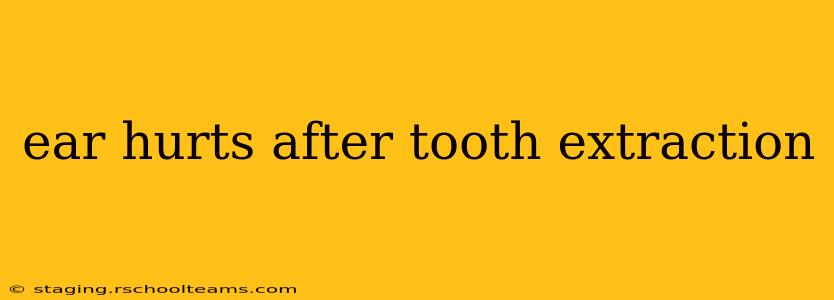Experiencing ear pain after a tooth extraction is more common than you might think. While it might seem unrelated, the proximity of your teeth to your ear and the intricate network of nerves in your jaw mean that pain can easily radiate. Understanding the causes of this pain is crucial for effective management and knowing when to seek professional help. This comprehensive guide will explore the reasons behind post-extraction earache, offer effective remedies, and outline when it's time to consult your dentist or doctor.
Why Does My Ear Hurt After a Tooth Extraction?
The connection between your teeth and your ear isn't just anatomical; it's also neurological. Several factors contribute to ear pain following a tooth extraction:
-
Referred Pain: This is the most common cause. Nerves in your jaw and face are interconnected. Inflammation or irritation from the extraction site can trigger pain signals that your brain interprets as originating from your ear. Think of it like a misdirected pain message.
-
Infection: A post-extraction infection can spread, leading to pain in your jaw, ear, and even your neck. This is often accompanied by other symptoms like swelling, fever, and pus.
-
Sinus Infection: Upper teeth extractions, especially molars, are close to the maxillary sinuses. If the extraction site becomes infected, it can spread to the sinuses, causing pain that radiates to the ear and face.
-
Dry Socket: This painful condition occurs when the blood clot protecting the extraction site dislodges prematurely. The exposed bone is then exposed to air and bacteria, causing intense pain that can spread to the ear.
-
TMJ Issues: The temporomandibular joint (TMJ) connects your jaw to your skull near your ear. Trauma during the extraction, or the subsequent inflammation, can affect this joint, resulting in ear pain.
-
Existing Ear Condition: If you had a pre-existing ear condition, the procedure might aggravate it, leading to increased pain.
What Can I Do to Relieve the Ear Pain?
While it's crucial to consult your dentist, several at-home remedies can provide temporary relief:
-
Over-the-Counter Pain Relievers: Ibuprofen or acetaminophen can help manage pain and reduce inflammation. Always follow the recommended dosage.
-
Ice Packs: Applying ice packs to the affected area for 15-20 minutes at a time can help reduce swelling and numb the pain.
-
Warm Compress: A warm compress can help promote blood flow and reduce stiffness in the jaw, potentially alleviating some ear pain.
-
Saltwater Rinse: Gently rinsing your mouth with warm saltwater several times a day can help keep the extraction site clean and prevent infection.
-
Rest: Give your body time to heal. Avoid strenuous activities and get plenty of rest.
-
Avoid Straws: Using straws creates suction, which can dislodge the blood clot and increase the risk of a dry socket.
When Should I See a Doctor or Dentist?
While some ear pain is normal after a tooth extraction, it's important to seek professional help if:
-
The pain is severe or worsening: Pain that doesn't respond to over-the-counter pain relievers or that intensifies requires immediate attention.
-
You have a fever: A fever is a sign of infection.
-
You notice swelling or pus: These are also indicative of infection.
-
You have difficulty opening your mouth: This can suggest a more serious complication.
-
The pain lasts longer than a few days: Persistent pain warrants a follow-up appointment.
How Long Does Ear Pain After Tooth Extraction Last?
The duration of ear pain varies, typically lasting a few days to a week. If the pain persists beyond this timeframe or worsens, consult your dentist or doctor.
Can a Tooth Extraction Cause Permanent Ear Damage?
While rare, complications from a tooth extraction could potentially lead to temporary or, in very exceptional circumstances, long-term ear issues. This is typically associated with severe infection or damage to surrounding structures. It's crucial to follow post-operative instructions and seek professional help if complications arise.
Is the Ear Pain Related to the Wisdom Tooth Extraction?
Wisdom tooth extractions are often associated with more significant post-operative pain, including ear pain, due to the complex nature of the procedure and the location of the wisdom teeth. The same causes and remedies discussed above still apply.
This information is for general knowledge and does not constitute medical advice. Always consult your dentist or doctor for any concerns about your health. They can provide a proper diagnosis and treatment plan tailored to your specific situation.
